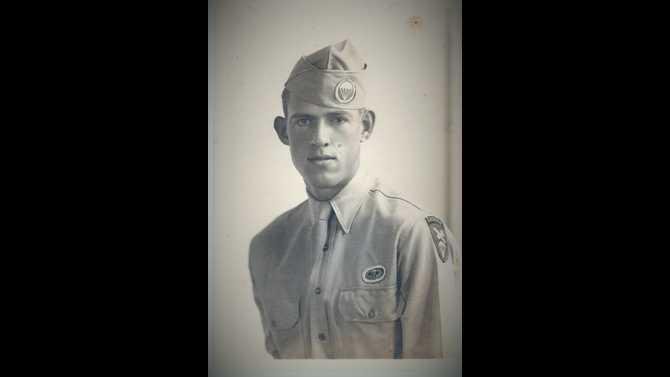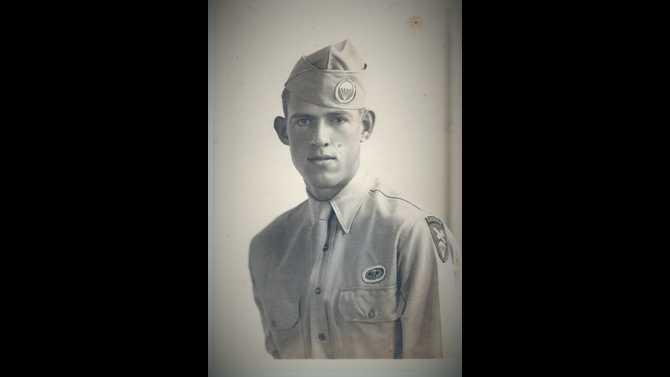The email from Covington resident Joe “Pete” Madding stimulated my curiosity. A handmade trench knife, lost in combat by an 82nd airborne paratrooper during the Battle of the Bulge who also came dangerously close to losing his leg, found its way back to Paris, TX in 1972 to a man who crafted the weapon 28 years beforehand.
The narrative is as eerie as it is thought-provoking. Yet war, like life, is an enterprise involving luck, survival, and a plethora of unknowns that defy explanation. And the story is a family affair.
A week after the attack on Pearl Harbor, Pete Madding’s father, George Madding, his brothers, and brothers-in-law marched down to the local induction center to volunteer for the fight against tyranny. George was disqualified by an unknown hernia discovered during his physical. Sent home, George underwent successful medical treatment for the hernia then reported back for induction. Medical approval didn’t contribute to his receiving a pair of dogtags; George was disqualified by age, 26, plus his status as a husband and father. The military wasn’t that desperate for soldiers, not yet.
Disappointed, George returned home and found employment with the Texas Highway Department as supervisor of maintenance. A highway department master machinist encouraged George’s inquisitive nature into producing handmade trench knives for the war effort. Dedicated by patriotism and wanting to do his part in the war, George worked all day, rode his bicycle home for dinner, then returned to his workshop to hammer and sharpen whatever raw materials were available into a stiletto masterpiece.
His son, Pete Madding, recalled, “The trench knives were handmade, crafted from discarded materials like old saw blades, and the handles came from billiard balls, leather, anything they found that was useful. Six or seven hours were needed to produce one knife. The scabbards were crafted by a saddle maker for $2.25 apiece, the only cost a soldier had to shoulder.”
Jack Madding, George’s brother, passed all the requirement for service in the US Army and in due course was jumping out of airplanes with the 82nd Airborne. George presented Jack with a special made trench knife to carry into combat. Sent to Lakenheath, England, Jack’s training as a paratrooper trained him to jump into combat, but instead he climbed aboard a glider with 7 other G.I.s to ride the winds of war into a meat grinder called the Battle of the Bulge. One hundred twenty airborne troopers crammed themselves into 19 or 20 gliders.
The winds of war, or rotten navigation, or bad luck, carried the gliders past their I.P. (initial point) straight into German-held territory. Near Withe, Belgium, the glider Jack Madding was riding into combat came to a rough stop before the paratroopers scrambled out. A shell from a German 88mm artillery piece immediately detonated among the men.
Jack Madding was knocked unconscious, one combat boot blown off his foot, his leg seriously wounded. When the guns fell silent the Germans searched for any signs of life, bayoneting the wounded and the dead. Only God knows why, but Jack Madding was not targeted by a bayonet. He awoke 2 hours later. Two other surviving paratroopers came out of hiding and helped Jack back to friendly lines. Five hours after suffering hideous wounds, Jack finally received medical attention. Of 120 troops packed into the gliders that landed near Withe, Belgium that day, only 7 survived.
Jack had lost his rifle, his handmade trench knife, and for some bizarre reason the Germans had cut his shoelaces. Once back in England, Jack fought and pleaded with surgeons not to remove his leg. Lady Luck had once again blessed Jack Madding; his leg healed, and he returned home on both legs. But difficult days lay ahead.
Pete Madding remembers, “We knew something was wrong with Uncle Jack. He was ‘out of sorts’….not the same man, they claimed my uncle suffered from ‘shell shock’. Today it’s known as Post Traumatic Stress Disorder, or PTSD. Call it what you may, but Uncle Jack died young at 50 years of age in 1972.”
The phone was ringing off the hook when the Madding family returned from Jack’s funeral. A gentleman named Ross had purchased a trench knife in a pawn shop around 1952. Pete Madding recalled, “Ross said an engraving on the blade identified George Madding as the maker of the trench knife. My dad asked him why he had waited so long to call. Ross replied, ‘I sat up in bed a few days ago and realized I had to return this knife to its legal owner, but I don’t know why.’ To our shock, Ross had this premonition on the same day and same time Uncle Jack passed away.”
Pete Madding continued, “Of course Dad asked if Ross would be willing to part with the knife and offered to pay any price. This kind gentleman would not accept a payment and sent the trench knife home to Paris, TX and the Madding family. Needless to say, the family was thankful beyond description.”
During this interview, Pete Madding revealed he was also a veteran. “I was a member of Uncle Sam’s Canoe Club,” he said, smiling. He meant, of course, the United States Navy. A graduate of Paris, TX high school, Pete attended North Texas State and fell in love with a young lady from East Texas State named Pat. She became an educator and spent over 30 years teaching in Georgia. Pete spent his Navy years as an air traffic controller.
He recalled, “I may have been in the Navy but was really a landlubber. I spent most of my time on Midway Island directing air traffic. I think my sea time was 11 days, aboard the British carrier Ark Royal and the WWII famed carrier USS Enterprise. You know, I figured my future was secure as an air traffic controller in civilian life, but after talking with several air controllers in Chicago who were most likely 30 years old and looked to be 50, I decided the stress would be a bit too much. I worked retail and owned a construction business for a few years before landing a position at Fort Gillem, GA as a logistics supervisor.”
During the Gulf War the Fort Gillem logistics team, in Pete’s own words, “Were as busy as a two-headed cat in a fish bowl.” Shipping and flying and trucking war material into Saudi Arabia required a herculean effort. “I wrote a paycheck to one worker who worked 80 hours of overtime in two weeks. But it was a labor of love because we knew the military in the Gulf needed the material so we got the job done.”
Pete Madding retired in 1995. Asked what retirement meant to him, he replied, “Doing as little as possible.” Pete’s dad, George Madding, quit making trench knives the same day the Japanese quit the war, stating, ‘When the Japs threw in the towel, so did I.’
War disrupts lives, tears families apart or binds families together. The Madding clan certainly did their part in WWII and Pete Madding carried the family standard into the US Navy. Their down-to-earth narrative is a story of how one family experienced the horrors and irony of a global conflict yet found solace in the return of an uncle’s trench knife. Life is not measured by accepted criteria but by the simple things, like a ‘good morning’ from a stranger, a ‘thank you for your service’ to a member of the armed services, or a trench knife lost during war then returned 20 years later to a family in need of closure.
Perhaps we could all use a ‘trench knife moment’ in our lives to recall the true cost of freedom.
Pete Mecca is a Vietnam veteran, columnist and freelance writer. You can reach him at aveteransstory@gmail.com or aveteransstory.us.





